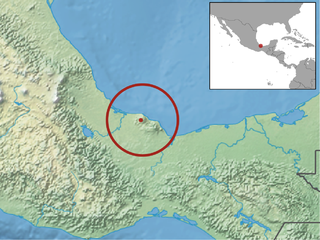
Nelson's collared lemming is a species of rodent in the family Cricetidae.
Nelson's giant deer mouse is a species of rodent in the family Cricetidae. It is found only in Mexico.
Nelson's woodrat is a species of rodent in the family Cricetidae. It is endemic to Mexico, where it is known only from the eastern slopes of the volcanoes Orizaba and Cofre de Perote. Due to the small geographic range, isolation, and low population, the Nelson's woodrat has a higher risk for extinction. The distribution and population sizes are small. The population exists in geographic isolation, which prevents gene flow
The Magdalena rat is a species of rodent in the family Cricetidae which is found only in a small region of western Mexico.

The Amargosa toad is a species of toad in the family Bufonidae. It was at one time considered to be a subspecies of the western toad. It is threatened by habitat loss and is classified by the IUCN as being "endangered".

The gray-barred wren is a species of bird in the family Troglodytidae. It is endemic to Mexico.

The dwarf vireo is a species of bird in the family Vireonidae. It is endemic to Mexico.
Nelson's kangaroo rat is a species of rodent in the family Heteromyidae which is endemic to the central plateau of Mexico.

The Trinidad spiny pocket mouse is a species of rodent in the family Heteromyidae. It is found in Colombia, Trinidad and Tobago, and Venezuela.

Heteromys is a genus of rodents in the family Heteromyidae, commonly known as spiny pocket mice. It is the only extant genus in the subfamily Heteromyinae which also includes the extinct genera Diprionomys and Metaliomys. Heteromys was recently enlarged by inclusion of the members of formerly recognized heteromyine genus Liomys, which was found to be paraphyletic.

Desmarest's spiny pocket mouse is a species of rodent in the family Heteromyidae. It is found in Colombia, Costa Rica, El Salvador, Guatemala, Honduras, Mexico, Nicaragua, and Panama.
Gaumer's spiny pocket mouse is a species of rodent in the family Heteromyidae. It ranges over northern Belize and Guatemala and the Yucatán Peninsula of Mexico, where it lives in lowland semideciduous forest and thorn scrub. The species is nocturnal and terrestrial; it is solitary and strongly territorial. It is named after physician and biologist George F. Gaumer, who lived in the Yucatán from 1885 to 1929.
The mountain spiny pocket mouse is a species of rodent in the family Heteromyidae. It is endemic to Costa Rica. Its natural habitat is subtropical or tropical moist lowland forests.

The Mexican spiny pocket mouse is a species of rodent in the family Heteromyidae. It is native to Mexico and Texas in the United States where it is found in dry, scrubby habitats. The IUCN has assessed it as being of "least concern". It was formerly placed in the genus Liomys, which is now recognized to be paraphyletic and has been subsumed into Heteromys.
The painted spiny pocket mouse is a species of rodent in the family Heteromyidae. It is found in Mexico and the northern tip of Guatemala. It was formerly placed in the genus Liomys, which is now recognized to be paraphyletic and has been subsumed into Heteromys.
The Jaliscan spiny pocket mouse is a species of heteromyid rodent endemic to Mexico. The specific name spectabilis means "striking", and refers to the animal's relatively bright coloration. It was formerly placed in the genus Liomys, which is now recognized to be paraphyletic and has been subsumed into Heteromys.
The Paraguaná spiny pocket mouse is a South American species of rodent in the family Heteromyidae. It is known from two localities at elevations above 200 m, Cerro Santa Ana and the Fila de Monte Cano, within the Paraguaná Peninsula in Venezuela. While this region consists mostly of arid shrublands, this pocket mouse is found in elevated areas that provide cloud forest or mesic habitat with evergreen and semideciduous vegetation, such as terrestrial bromeliads. It is more likely to be found near streams. The species is threatened by habitat degradation due to goat grazing and development.
The Ecuadoran spiny pocket mouse is a species of rodent in the family Heteromyidae. It is endemic to central western Ecuador, where it is found at elevations from sea level to 2000 m on the coastal plain and western slopes of the Andes. The species is nocturnal and lives in dry tropical evergreen forests of the southernmost extension of the Choco; it creates well-defined runways, and is often found near streams. It is threatened by deforestation and fragmentation of its remaining habitat.

Nelson's small-eared shrew is a species of mammal in the family Soricidae. It is endemic to eastern Mexico.

Nelson's sparrow is a small New World sparrow. This bird was named after Edward William Nelson, an American naturalist. Formerly, this bird and the saltmarsh sparrow were considered to be a single species, the sharp-tailed sparrow; because of this it was briefly known as Nelson's sharp-tailed sparrow.
This page is based on this
Wikipedia article Text is available under the
CC BY-SA 4.0 license; additional terms may apply.
Images, videos and audio are available under their respective licenses.











